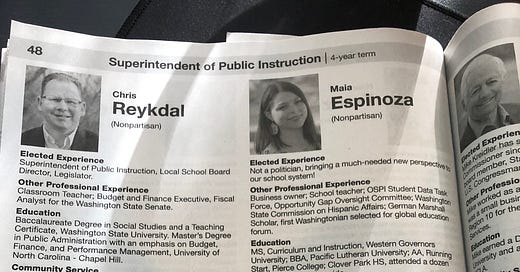A cheap lie in the voters pamphlet prompts an expensive campaign to defend OSPI chief
Maia Espinoza's whopper on the taxpayer's dime draws in $650K from WEA, other unions to defend Reykdahl
This is a story about how a cheaply told lie can be really expensive to fight. First, the lie: Maia Espinoza, a challenger to Superintendent of Public Instruction Chris Reykdahl, included this line in her statement in the voters pamphlet for the Aug. 4 primary: “The incumbent ignored parents and educators by championing a policy that teaches sexual posi…
Keep reading with a 7-day free trial
Subscribe to The Washington Observer to keep reading this post and get 7 days of free access to the full post archives.



